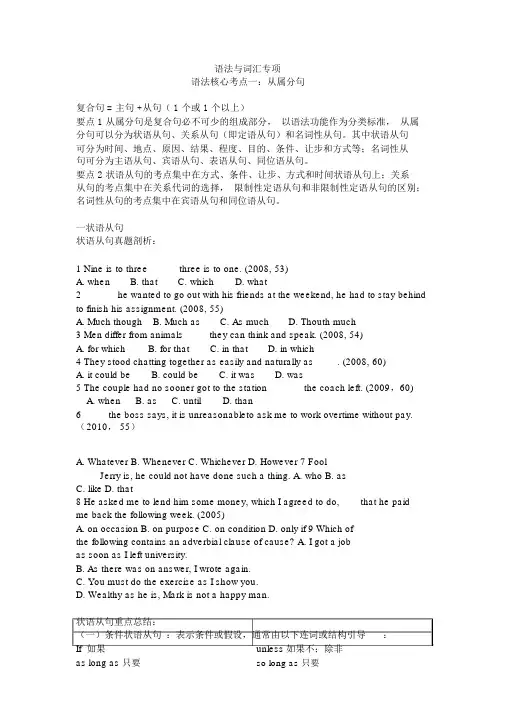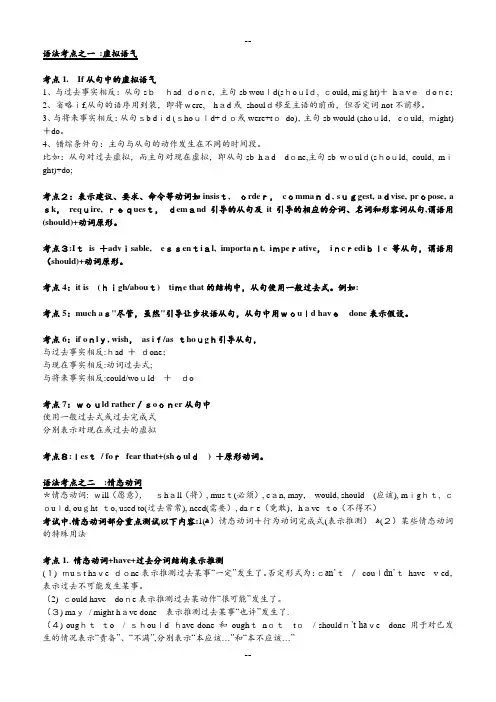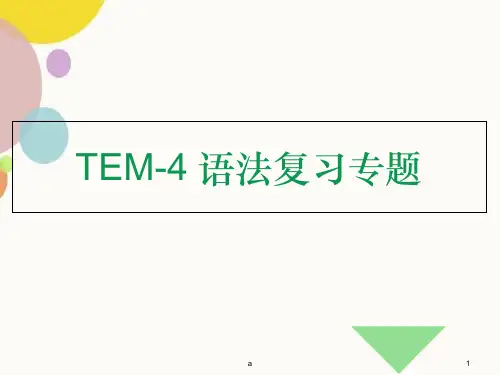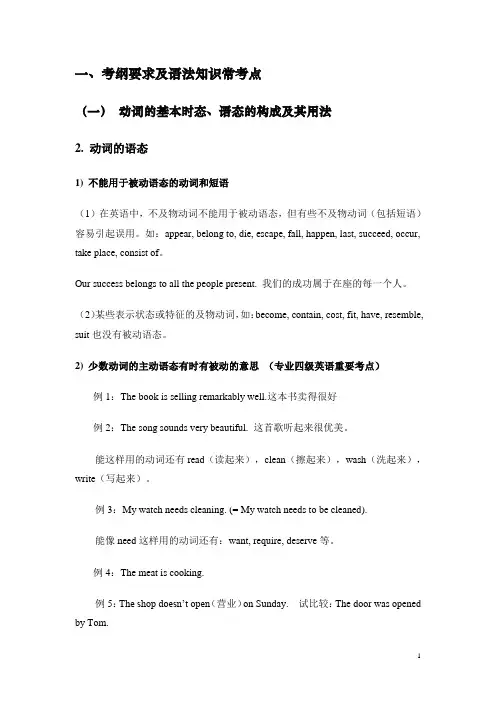专四语法专题. 共40页
专四常考语法点汇总

语法与词汇专项语法核心考点一:从属分句复合句 = 主句 +从句( 1 个或 1 个以上)要点 1 从属分句是复合句必不可少的组成部分,以语法功能作为分类标准,从属分句可以分为状语从句、关系从句(即定语从句)和名词性从句。
其中状语从句可分为时间、地点、原因、结果、程度、目的、条件、让步和方式等;名词性从句可分为主语从句、宾语从句、表语从句、同位语从句。
要点 2 状语从句的考点集中在方式、条件、让步、方式和时间状语从句上;关系从句的考点集中在关系代词的选择,限制性定语从句和非限制性定语从句的区别;名词性从句的考点集中在宾语从句和同位语从句。
一状语从句状语从句真题剖析:1Nine is to three _____ three is to one. (2008, 53)A. whenB. thatC. whichD. what2______ he wanted to go out with his friends at the weekend, he had to stay behind to finish his assignment. (2008, 55)A. Much thoughB. Much asC. As muchD. Thouth much3Men differ from animals ____ they can think and speak. (2008, 54)A. for whichB. for thatC. in thatD. in which4They stood chatting together as easily and naturally as ____. (2008, 60)A. it could beB. could beC. it wasD. was5The couple had no sooner got to the station ______ the coach left. (2009,60)A. whenB. asC. untilD. than6____ the boss says, it is unreasonableto ask me to work overtime without pay.(2010, 55)A. WhateverB. WheneverC. WhicheverD. However 7 Fool____ Jerry is, he could not have done such a thing. A. who B. asC. likeD. that8 He asked me to lend him some money, which I agreed to do, ___ that he paid me back the following week. (2005)A. on occasionB. on purposeC. on conditionD. only if 9 Which ofthe following contains an adverbial clause of cause? A. I got a jobas soon as I left university.B. As there was on answer, I wrote again.C. You must do the exercise as I show you.D. Wealthy as he is, Mark is not a happy man.状语从句重点总结:(一)条件状语从句:表示条件或假设,通常由以下连词或结构引导:If 如果unless如果不;除非as long as 只要so long as 只要on condition that 条件是in the event that 如果,在⋯⋯的情况下provided/providing that 假如given that 如果suppose/supposing that假如assuming (that ) 假如say 假如★特别提醒几种不常用的条件状语从句举例:In the event that she can not arrive on time, we will go first.Suppose it snowed, we would still go.Say what he said were true, what would you do about it?(二)让步状语从句:含有“虽然,尽管,即使”之意,主要引导词有:though/although 虽然even if/even though 即使no matter + 疑问词无论疑问词 +ever 无论in spite of the fact that 尽管while 尽管much as 不管⋯⋯尽管⋯⋯for all that 尽管as/though granted/granting (that ) 虽然,尽管★特别提醒1.几种不常用的让步状语从句举例:In spite of the fact that he was deaf and dumb, he had a genius for music.While the grandparents love the children, they are strict with them.Much as she needed the job, she had to refuse.For all that there were a lot of difficulties, he finally entered the final competition and won.Granted you have made much progress, you should not be conceited.2. 用了 although 或 though,就一定不能再后面的从句中同时用but,但是 though 可以和 yet 连用。
完整版专四英语语法考点分析解析

语法考点之一:虚拟语气考点1.If从句中的虚拟语气1、与过去事实相反:从句sbhad done,主句sb would(should, could, might)+havedone;2、省略if,从句的语序用到装,即将were,had或should移至主语的前面,但否定词not不前移。
3、与将来事实相反:从句sb did (should+do或were+todo),主句sb would (should,could, might)+do。
4、错综条件句:主句与从句的动作发生在不同的时间段。
比如:从句对过去虚拟,而主句对现在虚拟,即从句sb had done,主句sb would(should, could, might)+do;考点2:表示建议、要求、命令等动词如insist,order,command, suggest, advise, propose, a sk,require, request,demand引导的从句及it引导的相应的分词、名词和形容词从句,谓语用(should)+动词原形。
考点3:Itis +advisable,essential, important, imperative,incredible等从句,谓语用(should)+动词原形。
考点4:it is(high/about)time that的结构中,从句使用一般过去式。
例如:考点5:much as"尽管,虽然"引导让步状语从句,从句中用would havedone表示假设。
考点6:if only, wish,as if/as though引导从句,与过去事实相反:had +done;与现在事实相反:动词过去式;与将来事实相反:could/would+do考点7:would rather/sooner从句中使用一般过去式或过去完成式分别表示对现在或过去的虚拟考点8:lest/ forfear that+(should) +原形动词。
英语专四语法

一些名称Imperative mood祈使句request请求≈祈使句Subjunctive mood虚拟语气Dangling participle 虚悬分词Personal pronoun人称代词:包括属格和反身Generic reference 类指用法:定冠词a/an+名词单数”是表示“类指”/The + 名词复数Specific reference特指用法:定冠词the+名词单数或者加了定语修饰Pronoun代词Attributive后置定语Parenthesis插入语语法动名词做主语,常常表示泛指的一般行为或者概念,否定形式应把否定词放在动名词之前不定时作主语表示一次具体的行为1.语法一致原则(principle of grammatical concord)2.意义一致原则(principle of notional concord)3.就近原则(principle of proximity)单位名词(unit noun):用来表示不可数名词的数量,即不可数名词的个体性;它也能与可数名词搭配,表示“一双”、“一群”等意义.集合名词(Collective noun)意指一种可用来指称一群对象的字,而这些对象,可以是人、动物、或是一群概念等事物。
举例而言,在英语中,“一群狮子”可称为“a pride of lions”,此时“pride”为一个集合名词。
限定词:限定词分为三种:1、前位限定词(pre-determiner):all,both,half,分数词(one-third,one-fifth等), 倍数词(double,twice,three times等),such;2、中位限定词(central-determiner):冠词(a,an,the),指示代词(this,that,these,those),不定代词(some,any,either),否定词(no,neither),全称限定词(every,each),所有格(my,your,John's);3、后位限定词(post-determiner):基数词(three,200),序数词(first,second,300th,last),数量词及短语(many,much,little,few,plenty of,a lot of,a large number of)等。
专四语法专题

a
9
四、副 词
评注性状语、常见副词用法辨析、比较结构;(P273-274; P286; P292; P422)
1. Which of the following adverbs can NOT be used to complete “____
everybody came”? (2009-19)
A. nearly
____ a threat to the human race than environmental destruction. (2007-18)
A. no more
B. not more
C. even more D. much more
10. The couple had no sooner got to the station _____ the coach left.
考点一:限定词与三类名词的搭配关系 考点二:限定词排位(前中后位限定词)
1. Which of the following is INCORRECT? (2008-15) A. All his lectures were boring B. half his money was gone C. her few friends are all fond of dancing D. he invited many his friends to the party
a
4
一、名 词
复合名词的复数,双重属格 P57
复合名词的复数
1. There has been an increasing number of _________ in primary schools in the past few years. (2016-16) A. man teacher B. men teacher C. man teachers D. men teachers
(完整版)专四语法专题复习:限定词解读

➢限定词与三类名词的搭配关系
➢限定词与限定词的搭配关系 ➢若干限定词用法比较
(1)能与三类名词搭配的限定词
有些限定词如the,some,any,no,other,whose以及my, your等物主限定词和名词属格(John’s,my friend’s)等能与三类 名词搭配。例如:
the book
either, neither, enough); • 5、疑问限定词和关系限定词: what (ever),
which (ever),whose
b) 前位限定词包括 all,both,half; double,twice,three times等; one-third,two-fifths等; what,such (a/ an) (跨类限定词)。
A. the other B. enough C. a little D. much
4. There’s _C_ water in the bottle.
A. few B. a number of C. plenty of D. any
5. There is _C_ iron in this mine than in that one.
7. He has published _B_ short stories in English.
A. a great amount of B. a number of C. another D. many a
8. We had _D_ rainfalls last summer.
A. too much B. little C. a little D. only several
both workers
(a) few words
英语专业四级考试语法复习资料大全

一、考纲要求及语法知识常考点(一)动词的基本时态、语态的构成及其用法2. 动词的语态1) 不能用于被动语态的动词和短语(1)在英语中,不及物动词不能用于被动语态,但有些不及物动词(包括短语)容易引起误用。
如:appear, belong to, die, escape, fall, happen, last, succeed, occur, take place, consist of。
Our success belongs to all the people present. 我们的成功属于在座的每一个人。
(2)某些表示状态或特征的及物动词,如:become, contain, cost, fit, have, resemble, suit也没有被动语态。
2) 少数动词的主动语态有时有被动的意思(专业四级英语重要考点)例1:The book is selling remarkably well.这本书卖得很好例2:The song sounds very beautiful. 这首歌听起来很优美。
能这样用的动词还有read(读起来),clean(擦起来),wash(洗起来),write(写起来)。
例3:My watch needs cleaning. (= My watch needs to be cleaned).能像need这样用的动词还有:want, require, deserve等。
例4:The meat is cooking.例5:The shop doesn’t open(营业)on Sunday. 试比较:The door was opened by Tom.3) 注意几个基本句型.(专业四级英语重要考点)It is said …(据说).,It is reported …(据报道), It is widely believed(人们广泛认为); It is expected …(据期望,应该)It is estimated…. ( 据估计), It was said…, It was believed … It was thought …( 以前人们认为...)。
英语专业四级考试语法复习资料
英语专业四级考试语法复习资料一、考纲要求及语法知识常考点(一)名词、代词的数和格的构成及其用法1.有关名词的格的考点:名词可分为主格、宾格和所用格。
专业四级英语主要是考查名词所用格的掌握情况。
所有格可分为’s所有格与介词of所有格,前者一般用于有生命的名词,如:the boy’s ball,后者用于无生命的名词,如:the topic of the conversation (话题)。
另外还有双重属格,其表现形式为A of B’s,其中B必须是指人的名词。
如:a book of my wife’s(我妻子的一本书),而不能说a funnel of the ship’s.考点一:当名词表示地理、国家、城市、时间等词时,应该把它们当作有生命的名词对待,即用’s所有格。
如:Europe’s future 欧洲的未来Today’s newspaper 今天的报纸考点二:表示某物为两人或多人共有时,在最后一个人名后加’s,如果为词组内并列名词各自所有时,则要在各个名词后都加’s,例如:Mary and Linda’s book 玛丽与琳达(共同拥有)的书Tom’s and Peter’s fathers 汤姆的父亲与彼得的父亲考点三:人名’S所有格结构可以表示某人所在的店铺、家庭、学校与教堂等地点。
I am going to the tailor’s to get my dress. 我要去裁缝店拿回我的衣服。
I buy my meat at the Johnson’s 我常在约翰逊开的肉铺买肉。
They took part in the birthday party at Tom’s. 他们参加了在汤姆家举行的生日宴会。
2. 有关名词数的考点:考点一:复合名词的复数:一般而言,我们把核心词变为复数形式即可,如:passers-by, mothers-in-law; assistant directors;girl friends,但当修饰词是man,woman时,复合词各组成部分都要变为复数,例如:menservants,womenservants考点二:复数形式的名词用于单数概念,其谓语动词用单数。
英语专业四级考试语法复习资料大全
4)主语从句及介词but, except, besides+to do(do),如从句里或介词前有动词do,后面应
接不带to的不定式;如无do,则接to不定式,即带do不带to,带to不带do。如:
形
If I were to (should) teach you, I would teach in English.如果让我教你们,我就用英文授课。
试比较:I saw him singing when I passed by.
2)个别表示使役意义的动词,如:have, let, make
The teacher has/makes/lets us write a composition every week.
上述感觉动词或使役动词转换为被动结构时.其后的不定式一般需带to,如:
考点二:在下列it作形式主语或形式宾语的句型中,用动名词作逻辑主语或逻辑宾语。
It is no use(no good, no point, no sense, a waste of time等名词) + doing sth.
It is good ( nice, interesting, useless等形容词) + doing sth.;
The enemy soldiers had no choice but to surrender.敌军没有选择只好投降。
On Sunday afternoon I had nothing to do but watch TV.
What I have to do is take a rest.
3
(完整word版)英语专业四级考试语法汇总(word文档良心出品)
独立主格结构独立主格结构(Independent Genitive)有两部分组成,前一部份是名词或者代词,后一部分是非谓语动词(不定式、动名词和分词)或形容词、副词、或介词短语。
前后两部分具有逻辑主谓关系。
独立主格结构在句中做状语,多用于书面语。
独立主格结构本身不是句子,在句子中作状语,表示时间、原因、条件、伴随、目的等。
非谓语动词作状语,其逻辑主语须与主句主语保持一致。
若不一致,非谓语动词形式须另带主语,从而构成复合结构的形式作状语。
这种结构称为“独立结构”。
其中,非谓语动词主动用现在分词,被动用过去分词。
非谓语动词及其短语前面带有逻辑主语,逻辑主语的代词又是主格,故常称为“独立主格”。
“独立结构”在句中起状语作用,相当于状语从句,表示时间、原因、条件、方式或伴随等情况。
功能独立主格结构主要用于描绘性文字中,其作用相当于一个状语从句,常用来表示时间、原因、条件、行为方式或伴随情况等。
例如:表示时间The meeting being over, all of us went home. 开完会后我们都回家了。
Her work being done, she sat down for a cup of tea. 她干完了活,坐下来喝茶。
表示条件The condition being favorable, he may succeed. 若条件有利,他或许能成功。
表示原因There being no taxis, we had to walk. 没有出租车,我们只好步行。
He wrapped her up with great care, the night being dark and frosty. 夜又黑又冷,所以他把她裹得严严实实的。
表示伴随情况Almost all metals are good conductors, silver being the best of all. 几乎所有的金属都是良导体,而银则是最好的导体。
专四常考语法点汇总
语法与词汇专项语法核心考点一:从属分句复合句= 主句+从句(1个或1个以上)要点1从属分句是复合句必不可少的组成部分,以语法功能作为分类标准,从属分句可以分为状语从句、关系从句(即定语从句)和名词性从句。
其中状语从句可分为时间、地点、原因、结果、程度、目的、条件、让步和方式等;名词性从句可分为主语从句、宾语从句、表语从句、同位语从句。
要点 2 状语从句的考点集中在方式、条件、让步、方式和时间状语从句上;关系从句的考点集中在关系代词的选择,限制性定语从句和非限制性定语从句的区别;名词性从句的考点集中在宾语从句和同位语从句。
一状语从句状语从句真题剖析:1 Nine is to three _____ three is to one. (2008, 53)A. whenB. thatC. whichD. what2 ______ he wanted to go out with his friends at the weekend, he had to stay behind to finish his assignment. (2008, 55)A. Much thoughB. Much asC. As muchD. Thouth much3 Men differ from animals ____ they can think and speak. (2008, 54)A. for whichB. for thatC. in thatD. in which4 They stood chatting together as easily and naturally as ____. (2008, 60)A. it could beB. could beC. it wasD. was5 The couple had no sooner got to the station ______ the coach left. (2009,60)A. whenB. asC. untilD. than6 ____ the boss says, it is unreasonable to ask me to work overtime without pay. (2010,55)A. WhateverB. WheneverC. WhicheverD. However7 Fool ____ Jerry is, he could not have done such a thing.A. whoB. asC. likeD. that8 He asked me to lend him some money, which I agreed to do, ___ that he paid me back the following week. (2005)A. on occasionB. on purposeC. on conditionD. only if9 Which of the following contains an adverbial clause of cause?A. I got a job as soon as I left university.B. As there was on answer, I wrote again.C. You must do the exercise as I show you.D. Wealthy as he is, Mark is not a happy man.状语从句重点总结:几种不常用的条件状语从句举例:In the event that she can not arrive on time, we will go first.Suppose it snowed, we would still go.Say what he said were true, what would you do about it?1. 几种不常用的让步状语从句举例:In spite of the fact that he was deaf and dumb, he had a genius for music.While the grandparents love the children, they are strict with them.Much as she needed the job, she had to refuse.For all that there were a lot of difficulties, he finally entered the final competition and won.Granted you have made much progress, you should not be conceited.2. 用了although或though,就一定不能再后面的从句中同时用but,但是though 可以和yet 连用。
- 1、下载文档前请自行甄别文档内容的完整性,平台不提供额外的编辑、内容补充、找答案等附加服务。
- 2、"仅部分预览"的文档,不可在线预览部分如存在完整性等问题,可反馈申请退款(可完整预览的文档不适用该条件!)。
- 3、如文档侵犯您的权益,请联系客服反馈,我们会尽快为您处理(人工客服工作时间:9:00-18:30)。
三、限 定 词
限定词与三类名的词搭配,及限定词排位(P60-65)
考点一:限定词与三类名词的搭配关系 考点二:限定词排位(前中后位限定词)
1. Which of the following is INCORRECT? (2019-15) A. All his lectures were boring B. half his money was gone C. her few friends are all fond of dancing D. he invited many his friends to the party
2. Which of the following sentences is INCORRECT? (2019-18)
A. all his lectures are very interesting
B. half their saving were gone
C. many his friends came to the party
一、名 词
复合名词的复数,双重属格 P57
复合名词的复数
1. There has been an increasing number of _________ in primary schools in the past few years. (2019-16) A. man teacher B. men teacher C. man teachers D. men teachers
TEM-4 语法复习专题
TEM-4考试大纲 英语语法点概述 常考语法点分析 读题- 审题-解题
英语专业四级(TEM-4) 考试大纲
III、 语言知识(Part III:Language Knowledge)
1、测试要求 (a)掌握并能正确运用基本语法和句法。 (b)掌握认知词汇(5500-6000),并且能正确,熟练地运用其中的 3000-4000个单词及其最基本的搭配。 (c)考试时间10分钟
that cleverຫໍສະໝຸດ comment of your father's
---Who told you that?
---A friend of your father's.
---If he says such things, he is not a friend of my father.
二、代 词
代词及其先行项的数、性、人称的一致(P86-93, P316)
1. Nobody heard him sing, _____? (2019-14, P316)
A. did one
B. did he
C. didn't they D. did they
2. When one has good health,_____ should feel fortunate.
2、测试形式: 本部分采用多项选择题。共20道题,每题有四个选择项。题目中约50% 为词汇,词组和短语用法题,其余为语法和句法题。
3、测试目的: 测试学生掌握词汇,短语,及基本语法,句法概念的熟练程度。
常考语法点分析- 词法
名词(复合名词复数与双重属格) 代词(数、性、人称) 限定词(排位、与三类名词搭配) 副词(语法功能、评注性状语) 动词(动静态、情态动词) 非谓语动词(独立主格、逻辑主语、主动表被动)
名词双重属格
2. I can't put up with ________ . (2019-15)
A. that friend of you
B. that friend of yours
C. the friend of you
D. the friend of yours
名词双重属格:(P57) 即带有独立属格的of词组:a friend of the doctor's. 独立属格即省略名词属格中心词的属格结构:her memory is like an
D. both his sisters are nurses
(2019-16;2019-19)
A. you
B. they
C. he
D. we
语法一致原则和意义一致原则 先行项为everyone, everybody, no one, nobody, anyone, anybody,
someone, somebody等复合词时,通常按照用语法一致,采用单数形 式。 Everybody talked at the top of his voice • 非正式语体,也可根据意义一致原则采用复数代词; • 尤其为everyone,everybody时,采用复数代词比较自然。 Everyone was clapping their hands
elephant’s,类似于名词性物主代词用法:yours,hers 表部分:a friend of my father's = one of my father's friends;
a friend of a doctor’s (#)(介词of宾语必须特指) a cover of the book's(#)(介词of宾语一般指人) the daughter of Mr Green’s (#)(双重属格修饰的名词可带a,any, some等非确定特指的限定词,通常不带定冠词the) 表感情色彩,与this和that等指示限定词连用:this brilliant idea of his;
复合名词的复数形式: 1)中间没有连字符的复合名词变复数,通常最后一个词变复数: handbooks,bookstores;由man和woman构成的复合名词变复数,两个词 均要变为复数:men servants,women writers等 2)连字符连接的复合名词,一般把中心或主要名词变复数,editors-in-chief, sons-in-law,movie-lovers;没有主要名词时,最后一个词变复数:filmgoers(爱看电影的人) 3)部分词两者均可:consuls general,consul generals(总领事)
